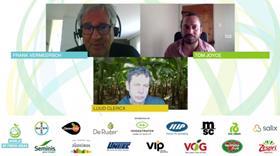
This year marks 25 years of Fairtrade bananas. Would you tell us a little bit about the journey that AgroFair and Fairtrade bananas have been on over the last 25 years?
Frank Vermeersch: I wasn’t there when it started, but I’m sure that at that moment there was a feeling of “against all odds”. The founding fathers of our company were the same as Max Havelaar. They knew already that with coffee something was very wrong, and they realised that with bananas it was a little bit the same.
In these 25 years, it has been quite a journey, with ups and downs, and now we are at this famous 25 years, and we realise that the job hasn’t been completed. There are a lot of other things that need to be tackled now. That’s why we have our projects, which are very important for us to progress.
Luud Clercx: A lot has happened in that time. We started with a few containers, now we’re doing more than 100 containers a week. And also other importers have started with Fairtrade. The concept of what Fairtrade is has also changed. Nowadays, what’s also important is biodiversity, sustainable soil management, promoting healthy soils, recycling plastic waste, reducing pesticides, carbon footprint, water footprint.
I’m working in the project department at AgroFair so we try to support our producers in those other areas as well. We now have a project to recycle banana plastic running in Peru and the Dominican Republic, for example. We have another project in the Dominican Republic helping our producers to get group certification for the alliance for water stewardship in the future.
The recent Covid-19 crisis has highlighted the importance of having a robust sustainable supply chain. Do you think things like the coronavirus give credence to Fairtrade and what you’re trying to do?
LC: Covid was an important lesson, although it didn’t affect the banana sector very much – we still delivered to Europe. It’s important to take biosecurity measures, for people’s health and also now for this new disease which appeared in Peru and Colombia, TR4. This is a very serious question for the banana sector because there’s nothing you can do about it. The only thing you can do is take biosecurity measures at the farm gate and also at the national level, preventing imports of infected planting material, for example.
Because this is a soil-borne disease, a fungus in the soil, there’s a hypothesis that the more biodiversity in the soil, the better, as part of the first defence lines against TR4. In the long run, you need a variety that is resistant against this disease. So there are now efforts going on, breeding to create this resistant variety. But it will take 10-12 years, I think.
In the Philippines, on conventional banana farms, there is a lot of use of synthetic fertiliser and pesticides. It kills the soil life to a great extent. It’s a free playing field for this TR4. What you see with organic bananas is greater biodiversity in the soil, and there’s a lot of competition among the microorganisms. There’s a food web in the soil itself, so other microorganisms attack this fungus. This hypothesis is being tested. There’s some anecdotal evidence that this could help.
Finally, where next for Fairtrade?
FV: Nowadays in continental Europe (it might be the same in the UK), everybody’s asking for organic Fairtrade, which is of course a very good thing. But what we need to keep in mind is that there’s still a lot of conventional Fairtrade. The problem is, if everybody’s asking for organic Fairtrade, there won’t be any space for conventional Fairtrade.
A danger for those who only have the possibility to grow conventional Fairtrade is, if everyone decides to have organic Fairtrade, those with conventional Fairtrade will go back to poverty. That is a real danger and problem. It is simply not possible to have organic Fairtrade from all regions of the world because the climatological conditions are sometimes not there. In the tropics where it’s much too wet, it’s simply not possible. So that is really a demand to start with conventional Fairtrade.
Of course, there’s another thing, the price issue, which is a race to the bottom. It’s ridiculous, asking for €0.69-€0.99 for 1kg of bananas. You cannot explain this anymore. It’s simply not possible. In fact, it has to stop.



